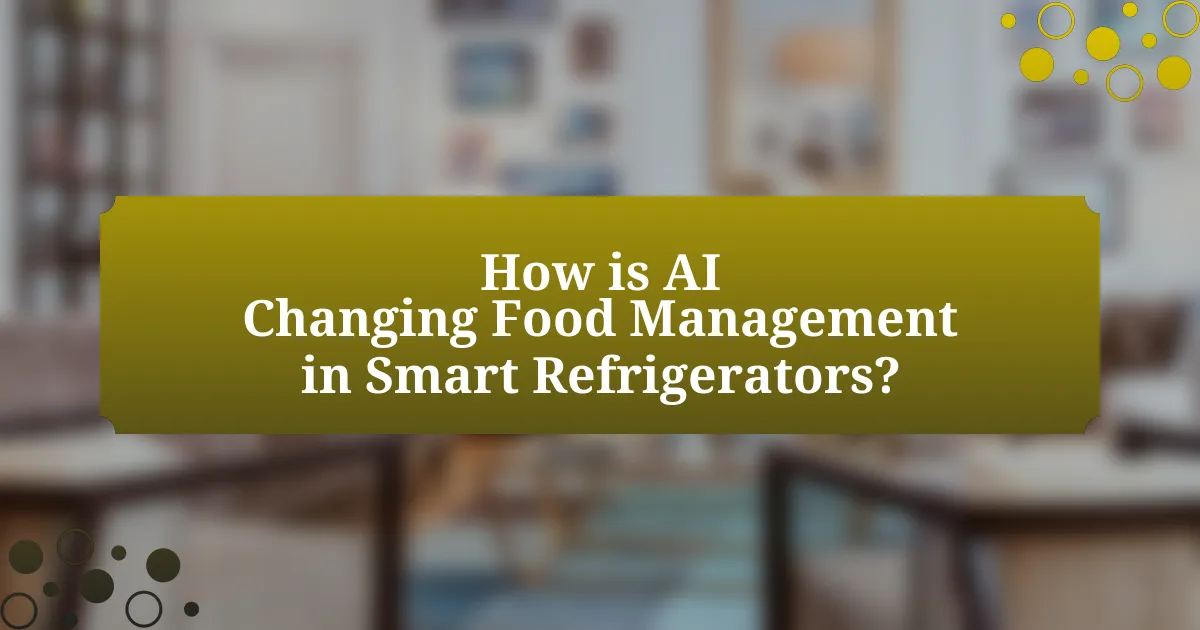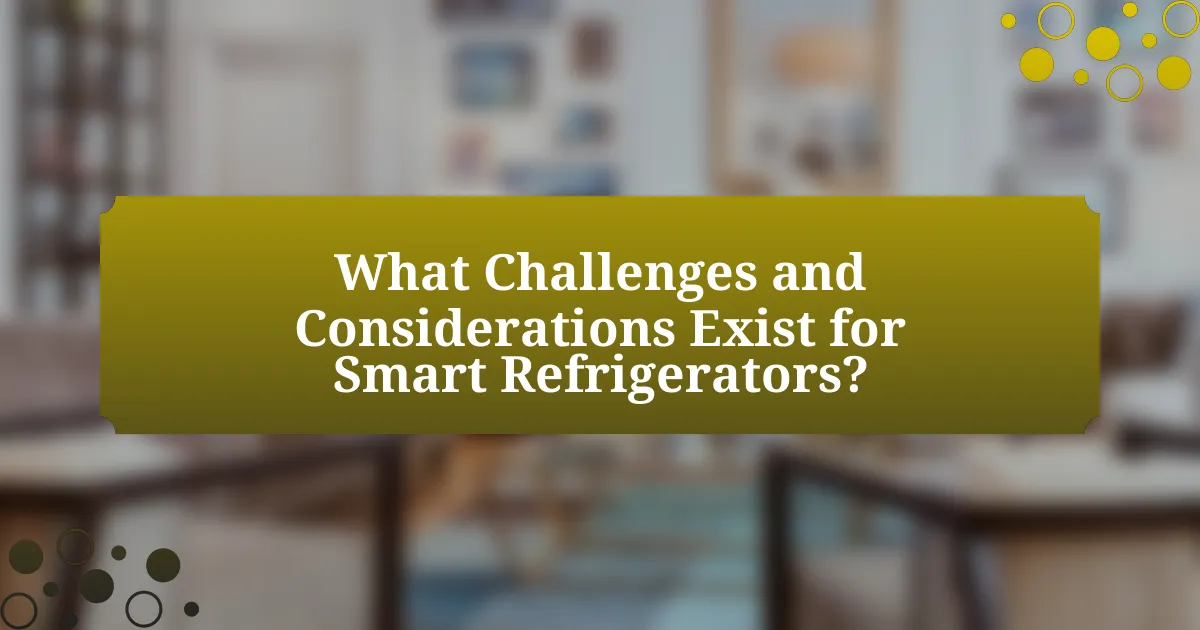Smart refrigerators represent a significant advancement in kitchen technology, integrating internet connectivity and artificial intelligence to enhance food management and storage. These appliances utilize sensors, cameras, and machine learning algorithms to monitor food inventory, track expiration dates, and provide personalized meal planning suggestions, ultimately reducing food waste and improving efficiency. Key features include real-time inventory management, temperature control, and connectivity with smart home devices, all of which contribute to energy savings and convenience. However, challenges such as cybersecurity risks and high costs remain considerations for consumers. This article explores how AI is transforming food management in smart refrigerators, detailing their functionalities, benefits, and the technologies that enable these innovations.

What are Smart Refrigerators and How Do They Work?
Smart refrigerators are advanced appliances that integrate internet connectivity and smart technology to enhance food management and storage. They work by utilizing sensors, cameras, and software to monitor the contents inside, track expiration dates, and provide users with notifications and suggestions for meal planning. For example, many smart refrigerators can connect to mobile apps, allowing users to view the contents remotely, create shopping lists, and receive alerts when items are running low or nearing expiration. This functionality is supported by the increasing adoption of IoT (Internet of Things) technology in household appliances, which has been shown to improve food waste management and streamline grocery shopping processes.
How is AI Integrated into Smart Refrigerators?
AI is integrated into smart refrigerators through advanced algorithms and sensors that monitor food inventory, optimize energy consumption, and enhance user interaction. These refrigerators utilize image recognition technology to identify items stored inside, allowing users to track expiration dates and receive notifications for items that need to be consumed soon. Additionally, AI can analyze usage patterns to suggest recipes based on available ingredients, thereby reducing food waste. The integration of machine learning enables these devices to adapt to user preferences over time, improving efficiency and convenience in food management.
What technologies enable AI functionality in smart refrigerators?
AI functionality in smart refrigerators is enabled by technologies such as machine learning, computer vision, and the Internet of Things (IoT). Machine learning algorithms analyze user behavior and preferences to optimize food storage and suggest recipes. Computer vision technology allows the refrigerator to recognize items inside, track expiration dates, and manage inventory effectively. The IoT connects the refrigerator to the internet, enabling remote monitoring and control through mobile applications, enhancing user interaction and convenience. These technologies collectively improve food management and reduce waste, demonstrating their significant impact on the functionality of smart refrigerators.
How does AI enhance the user experience in food management?
AI enhances the user experience in food management by providing personalized recommendations, optimizing inventory tracking, and reducing food waste. Smart refrigerators equipped with AI can analyze user preferences and dietary restrictions to suggest recipes and meal plans tailored to individual tastes. Additionally, AI systems monitor food inventory in real-time, alerting users when items are running low or nearing expiration, which helps in efficient meal planning and shopping. Research indicates that AI-driven food management solutions can reduce food waste by up to 30%, as they enable users to make informed decisions about food usage and storage.
What Features Do Smart Refrigerators Offer?
Smart refrigerators offer features such as inventory management, temperature control, and connectivity with smart home devices. These refrigerators can track food items, alert users when supplies are low, and suggest recipes based on available ingredients. Additionally, they often include touchscreens for easy access to information and can be controlled remotely via smartphone apps. The integration of AI enhances food management by optimizing storage conditions and reducing food waste, as evidenced by studies showing that smart appliances can help households save up to 20% on grocery bills by minimizing spoilage.
How do smart refrigerators manage inventory?
Smart refrigerators manage inventory by utilizing sensors, cameras, and artificial intelligence to track the contents inside. These devices can identify items based on barcodes or image recognition, allowing them to monitor quantities and expiration dates. For instance, a smart refrigerator may send notifications to users when items are running low or nearing expiration, facilitating better food management and reducing waste. This capability is supported by advancements in machine learning algorithms that enhance the accuracy of inventory tracking and user interaction.
What role does temperature control play in food preservation?
Temperature control is crucial in food preservation as it inhibits the growth of bacteria, molds, and yeasts that cause food spoilage. By maintaining optimal temperatures, typically below 40°F (4°C) for refrigeration and below 0°F (-18°C) for freezing, food can remain safe and fresh for extended periods. Research indicates that proper temperature management can reduce foodborne illnesses significantly, as pathogens thrive at higher temperatures. For instance, the Centers for Disease Control and Prevention (CDC) states that keeping food at safe temperatures can prevent the growth of harmful microorganisms, thereby extending shelf life and ensuring food safety.
What are the Benefits of Using Smart Refrigerators?
Smart refrigerators offer several benefits, including enhanced food management, energy efficiency, and convenience. These appliances utilize advanced technology to monitor food inventory, track expiration dates, and suggest recipes based on available ingredients, which helps reduce food waste. Additionally, smart refrigerators often feature energy-saving modes and can be controlled remotely via smartphone apps, allowing users to adjust settings and receive alerts about energy consumption. Studies indicate that households using smart appliances can save up to 30% on energy costs compared to traditional models, reinforcing the financial advantages of adopting this technology.
How do smart refrigerators reduce food waste?
Smart refrigerators reduce food waste by utilizing advanced technology to monitor food inventory and expiration dates. These appliances often feature internal cameras and sensors that track the freshness of items, alerting users when food is nearing its expiration. Research indicates that approximately 30-40% of the food supply in the U.S. is wasted, and smart refrigerators can help mitigate this by providing reminders and suggestions for meal planning based on available ingredients. Additionally, some models can connect to apps that offer recipes tailored to the items in the fridge, encouraging users to consume what they have before it spoils.
What cost savings can users expect from smart refrigerators?
Users can expect significant cost savings from smart refrigerators primarily through reduced energy consumption and minimized food waste. Smart refrigerators utilize energy-efficient technologies and can optimize cooling based on usage patterns, leading to lower electricity bills. For instance, a study by the U.S. Department of Energy indicates that energy-efficient appliances can save households approximately $100 annually on energy costs. Additionally, smart refrigerators often feature inventory management systems that track food expiration dates and suggest recipes, which helps users avoid purchasing unnecessary items and reduces spoilage. Research from the Food Waste Reduction Alliance shows that households can save up to $1,500 per year by reducing food waste, further enhancing the financial benefits of using smart refrigerators.

How is AI Changing Food Management in Smart Refrigerators?
AI is transforming food management in smart refrigerators by enabling real-time inventory tracking and expiration date monitoring. Smart refrigerators equipped with AI can automatically scan and recognize food items, providing users with updates on what is available, what needs to be consumed soon, and even suggesting recipes based on the ingredients present. This technology reduces food waste by alerting users to items nearing expiration and optimizing grocery shopping by suggesting purchases based on current inventory levels. Studies indicate that households using AI-enabled smart refrigerators can reduce food waste by up to 30%, demonstrating the significant impact of AI on efficient food management.
What are the Key AI Applications in Food Management?
Key AI applications in food management include inventory management, demand forecasting, and food safety monitoring. Inventory management utilizes AI algorithms to track stock levels and expiration dates, optimizing the use of perishable goods and reducing waste. Demand forecasting employs machine learning to analyze historical sales data and predict future demand, enabling better purchasing decisions and minimizing overstock. Food safety monitoring leverages AI to analyze data from sensors and cameras, ensuring compliance with health regulations and identifying potential hazards in real-time. These applications collectively enhance efficiency, reduce waste, and improve food safety in the food management sector.
How does AI predict food expiration dates?
AI predicts food expiration dates by analyzing data from various sources, including historical shelf-life data, environmental conditions, and product characteristics. Machine learning algorithms process this information to identify patterns and make accurate predictions about when food items are likely to spoil. For instance, a study published in the journal “Food Quality and Preference” demonstrated that AI models could predict spoilage with over 90% accuracy by considering factors such as temperature fluctuations and humidity levels. This data-driven approach allows smart refrigerators to provide real-time updates and alerts, helping consumers manage food freshness effectively.
What is the role of AI in meal planning and recipe suggestions?
AI plays a crucial role in meal planning and recipe suggestions by analyzing user preferences, dietary restrictions, and available ingredients to generate personalized meal plans. This technology utilizes algorithms to recommend recipes that align with individual tastes and nutritional needs, enhancing the cooking experience. For instance, AI systems can scan a user’s pantry inventory and suggest meals based on what is on hand, reducing food waste and optimizing grocery shopping. Studies have shown that AI-driven meal planning can lead to healthier eating habits and improved meal variety, as evidenced by research from the Journal of Nutrition Education and Behavior, which highlights the effectiveness of technology in promoting dietary changes.
How Does AI Improve Food Safety and Quality?
AI improves food safety and quality by utilizing advanced algorithms to monitor and analyze food storage conditions in real-time. Smart refrigerators equipped with AI can track temperature, humidity, and expiration dates, ensuring optimal storage environments that prevent spoilage and contamination. For instance, a study by the Food and Agriculture Organization indicates that maintaining proper temperature control can reduce foodborne illnesses by up to 30%. Additionally, AI can predict food spoilage patterns, allowing for timely consumption or disposal, thereby enhancing overall food quality and safety.
What monitoring systems are in place for food safety?
Monitoring systems for food safety include Hazard Analysis Critical Control Point (HACCP), temperature monitoring systems, and traceability systems. HACCP is a systematic preventive approach that identifies and controls potential hazards in food production, ensuring safety from biological, chemical, and physical hazards. Temperature monitoring systems utilize sensors to continuously track the temperature of food storage environments, which is crucial for preventing spoilage and bacterial growth. Traceability systems allow for tracking the origin and journey of food products through the supply chain, enabling quick responses to food safety issues. These systems collectively enhance food safety by providing real-time data and accountability throughout the food management process.
How does AI assist in maintaining optimal storage conditions?
AI assists in maintaining optimal storage conditions by utilizing sensors and algorithms to monitor and adjust temperature and humidity levels in real-time. These systems analyze data from various sources, such as internal sensors and external weather conditions, to ensure that food is stored at the ideal conditions, thereby extending shelf life and reducing spoilage. For instance, smart refrigerators equipped with AI can automatically adjust cooling settings based on the type of food stored, as demonstrated by research from the International Journal of Refrigeration, which highlights that AI-driven temperature control can reduce food waste by up to 30%.

What Challenges and Considerations Exist for Smart Refrigerators?
Smart refrigerators face several challenges and considerations, including cybersecurity risks, high costs, and compatibility issues with existing appliances. Cybersecurity is a significant concern, as these devices connect to the internet and can be vulnerable to hacking, potentially compromising personal data. The high initial investment for smart refrigerators can deter consumers, as they often cost significantly more than traditional models. Additionally, compatibility with other smart home devices can be problematic, as not all appliances communicate seamlessly, leading to user frustration. These challenges must be addressed to enhance the adoption and functionality of smart refrigerators in modern kitchens.
What are the Common Technical Issues with Smart Refrigerators?
Common technical issues with smart refrigerators include connectivity problems, software glitches, sensor malfunctions, and cooling inconsistencies. Connectivity problems often arise due to Wi-Fi signal interference, which can disrupt the refrigerator’s ability to communicate with mobile apps or smart home systems. Software glitches may lead to unresponsive touchscreens or incorrect temperature settings, affecting the appliance’s performance. Sensor malfunctions can result in inaccurate readings of temperature or humidity, impacting food preservation. Lastly, cooling inconsistencies may occur due to compressor issues or blocked vents, leading to uneven temperatures inside the refrigerator. These issues can hinder the functionality and efficiency of smart refrigerators, making it essential for users to address them promptly.
How can users troubleshoot connectivity problems?
Users can troubleshoot connectivity problems by first checking their internet connection to ensure it is active and stable. This involves verifying that the router is powered on, connected to the modem, and that other devices can access the internet. If the internet is functioning, users should then restart their smart refrigerator and the router to refresh the connection. Additionally, users can check for software updates for the refrigerator, as outdated firmware can lead to connectivity issues. If problems persist, users should consult the refrigerator’s user manual for specific troubleshooting steps or contact customer support for further assistance.
What maintenance practices can enhance the longevity of smart refrigerators?
Regular maintenance practices that enhance the longevity of smart refrigerators include cleaning the condenser coils, checking and replacing door seals, and ensuring proper temperature settings. Cleaning the condenser coils every six months prevents dust buildup, which can cause the refrigerator to overheat and work harder, leading to increased energy consumption and wear. Inspecting and replacing door seals ensures that cold air remains inside, reducing energy loss and maintaining efficiency. Additionally, setting the refrigerator temperature between 35°F and 38°F optimizes food preservation while minimizing strain on the compressor. These practices are supported by appliance maintenance guidelines from manufacturers, which emphasize the importance of routine care for optimal performance and lifespan.
What are the Privacy and Security Concerns Related to Smart Refrigerators?
Smart refrigerators pose significant privacy and security concerns primarily due to their connectivity and data collection capabilities. These devices often collect personal information, such as dietary preferences and shopping habits, which can be vulnerable to unauthorized access or data breaches. For instance, a report by the Identity Theft Resource Center indicated that in 2020, data breaches in connected devices increased by 25%, highlighting the risks associated with smart appliances. Additionally, smart refrigerators can be hacked, allowing malicious actors to gain control over the device, potentially leading to unauthorized surveillance or manipulation of the appliance’s functions. The combination of sensitive data collection and potential vulnerabilities underscores the importance of robust security measures in the design and use of smart refrigerators.
How can users protect their data when using smart refrigerators?
Users can protect their data when using smart refrigerators by implementing strong security measures such as changing default passwords, enabling two-factor authentication, and regularly updating the device’s firmware. Changing default passwords prevents unauthorized access, as many devices come with easily guessable credentials. Enabling two-factor authentication adds an extra layer of security, requiring a second form of verification beyond just a password. Regular firmware updates are crucial because they often include security patches that address vulnerabilities. According to a study by the Ponemon Institute, 60% of data breaches are linked to weak or stolen passwords, highlighting the importance of robust security practices.
What measures do manufacturers take to ensure user privacy?
Manufacturers implement several measures to ensure user privacy in smart refrigerators. These measures include data encryption, which protects user information during transmission, and strict access controls that limit who can view or manipulate data. Additionally, manufacturers often conduct regular security audits and updates to identify and fix vulnerabilities. For instance, companies like Samsung and LG have established privacy policies that comply with regulations such as GDPR, ensuring that user data is handled responsibly and transparently.
What Practical Tips Can Users Follow for Effective Food Management?
To manage food effectively, users should implement inventory tracking, meal planning, and proper storage techniques. Inventory tracking involves regularly checking and organizing food items to minimize waste and ensure freshness. Meal planning allows users to create shopping lists based on what they already have, reducing unnecessary purchases and promoting the use of perishable items. Proper storage techniques, such as using airtight containers and labeling items with expiration dates, help maintain food quality and safety. Research indicates that effective food management can reduce food waste by up to 30%, highlighting the importance of these practices in promoting sustainability and efficiency in food usage.
How can users optimize their smart refrigerator settings for better food management?
Users can optimize their smart refrigerator settings for better food management by utilizing features such as temperature control, inventory tracking, and expiration date notifications. Adjusting the temperature settings to the recommended levels—typically around 37°F (3°C) for the refrigerator and 0°F (-18°C) for the freezer—ensures food stays fresh longer. Inventory tracking allows users to monitor what items are available, reducing food waste and enabling better meal planning. Additionally, setting up expiration date notifications helps users consume food before it spoils, further enhancing food management efficiency. These features collectively contribute to a more organized and efficient food storage system, aligning with the advancements in AI technology that smart refrigerators offer.
What best practices should users adopt for inventory tracking?
Users should adopt real-time tracking, regular audits, and data analytics for effective inventory tracking. Real-time tracking allows users to monitor stock levels continuously, reducing the risk of overstocking or stockouts. Regular audits help verify inventory accuracy and identify discrepancies, ensuring that records match physical stock. Data analytics can provide insights into consumption patterns, enabling users to make informed decisions about purchasing and stocking. According to a study by the National Association of Wholesaler-Distributors, companies that implement these best practices can reduce inventory costs by up to 30%.














